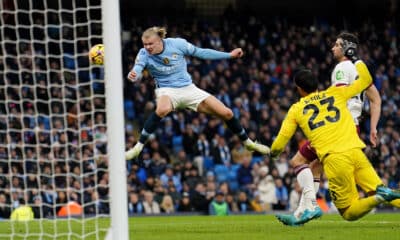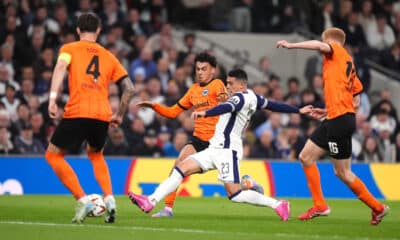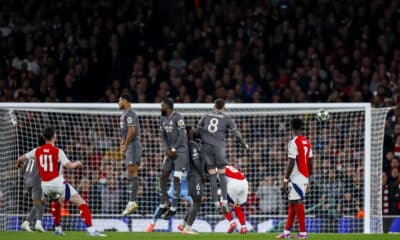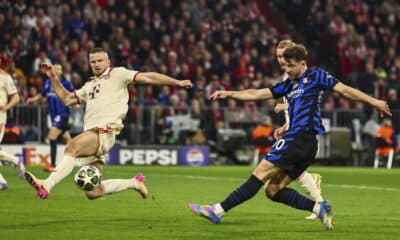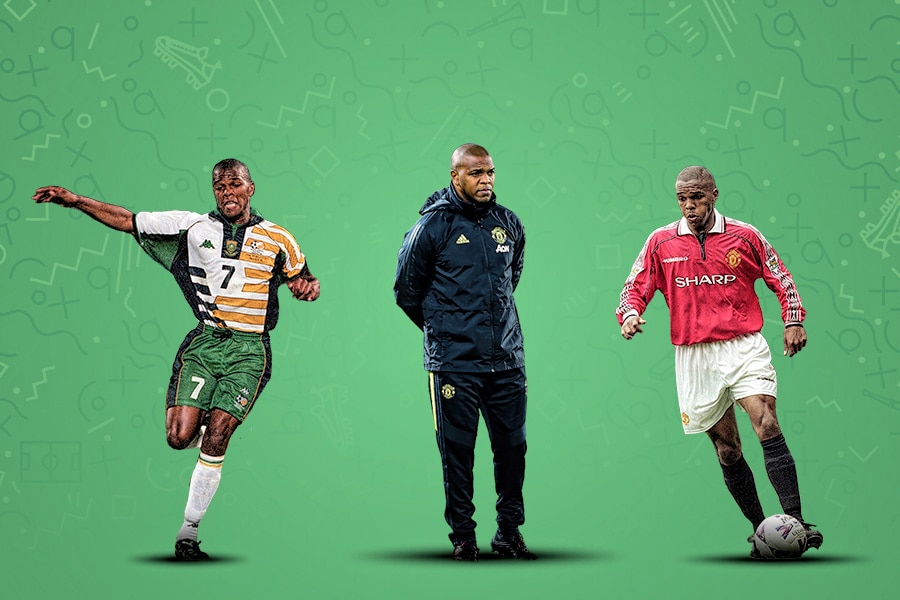
I couldn’t help but smile last week when I saw that former Bafana Bafana star Quinton Fortune had been appointed as a First Team Coach at English Championship side Reading.
It was heartwarming to see Fortune brought on board by the Championship team, and also happening at the same time that New York Red Bulls Assistant Coach Bradley Carnell was elevated to the interim head coach role in the USA.
I have always wanted to see South Africans excelling overseas, and not just players, but coaches too. I thought if anyone could do it, it would be guys like Quinton or Benni McCarthy, or Shaun Bartlett or Lucas Radebe, ex-players with high profiles in Europe, that could lead the way in that department.
Someone like Pitso Mosimane should really be in a top job in Europe by now, but for the most part, African coaches don’t always get the opportunities or respect they should. I have been fortunate enough to speak to many coaches from around the world, some brilliant footballing minds, and Pitso is right up there with them.
The fact is that black coaches, in particular, have it difficult. Just a few months ago Quinton spoke about the lack of black coaches in top positions in the UK.
“Around 34 per cent of players in the Premier League are black, maybe more, but when we look at coaches right around the Premier League and Football League, six per cent are black coaches,” Quinton told SkySports.
“I’m all for the Rooney Rule. It’s a great step forward in terms of giving BAME (Black, Asian and Minority Ethnic) coaches the opportunity to have an interview. That’s progress. Any club can have diversity, inclusion, but you need to have a target. For the next 18 months, I want to see four or five black coaches in the Premier League.”
“But not just in coaching, board members as well. You need to put them in a position where they can learn. It will be brilliant for the game because different minds, different ways of looking at things. It will inspire people from BAME backgrounds to see someone they can identify with.”
It is important to have diversity and I would encourage every club to do it, but the next step is keeping those black and Asian players there for a long period of time. Put them in positions of leadership and then see what happens. That’s real change.
“Les Ferdinand, look at what he is doing as director of sport at QPR. I think Chris Hughton was the last black manager in the Premier League. You need more. It is not possible to have 34 per cent of players being black and no black coaches. You need real change.”
It should be an interesting experience for Fortune at Reading, who recently appointed a new manager in Serbian Veljko Paunovic, and they will be looking to improve on their 14th spot from last season. Paunovic is a former teammate of Fortune from his early days at Atletico Madrid.
Reading’s home ground, the Madejski Stadium, was the first ground in the UK I watched a live game at. I went with a delegation from the Football Manager video game, and we got first class treatment, as we were seated in the Executive seats. We spent a good part of the day at the ground, arriving early and holding part of our conference there.
It was Reading versus Blackpool in the Championship, and I quite enjoyed the experience. The football wasn’t brilliant, but the atmosphere sure was. It’s a magnificent little stadium, and the fans were terrific.
I also remember bumping into former Blackburn Rovers striker Jason Roberts after the game, and we got talking about Benni of course. At the time Benni was busy having his swan song with Orlando Pirates, and Roberts was happy to hear he was showing his class again.
Four years later I was back in the UK for another Football Manager conference, and this time it was in Manchester. I was only in the city for three busy days and nights, so wasn’t going to see Quinton, but we chatted while I was there.
Q and I became friendly a few years earlier. He frequently visits Cape Town with his family here, and he would often be involved in workshops and courses.
There was also one occasion at the District Six Museum I remember well. The museum was honouring Albert Johannesson, the former Leeds United legend, who of course was South African, and he was also the first black player to play in the FA Cup final. Quinton was in attendance, as was Lucas Radebe, and a few other retired EPL stars, some of whom had played for Leeds.
What started as a five minute interview, turned into an hour long chat about football, life and South Africa.
I remember we also chatted about Anele Ngcongca. Anele had been in town a few months earlier and had told me how he owed his career to Quinton. Before moving to Europe, Anele had played for FC Fortune, a now defunct club that Quinton had been involved in.
The chat continued at a festival the Premier League was hosting in South Africa, where Quinton was representing Manchester United as an ambassador. Quinton had a bodyguard with him for the event, and he was an interesting guy too, from Liverpool. They had a brilliant banter going between them, but also great mutual respect. The bodyguard’s mother worked at the slave museum in Liverpool, and the chat we had skewed from football to the history of slavery.
From then on Q and I kept in contact regularly. He would ask about what was happening in South Africa or what young players to keep an eye on. He was keen to help South African football improve and wanted to get involved.
The Kewtown-born footballer had left South Africa at the tender age of 14. Quinton was the youngest brother in a talented Cape Town football family (his brothers Deon, Peter, Colin and Desmond all excelled at the game).
His brother Deon was one of his heroes and Quinton says he was the best footballer in the family.
“My brother Deon,” Quinton told me, “my brother was the star in the family! I was the baby, my brother was the star. I remember Puzzy Jensen used to come pick him up in the day. I have four brothers, and they were all my heroes.”
“I was lucky that when I grew up there was so much football around,” Quinton said, and it was true as he lived just around the corner from the Athlone Stadium. And I was just part of that.”
Of course I loved the guys like Doctor when I was growing up and starting watching the professional game. Professor Ngubane, Jomo, Scara, Teenage Dladla, I mean, come on, please, please, when they used to come to Cape Town, oh my goodness. When Professor sat on the ball, the Athlone Stadium was bouncing! I miss those days!
Benni McCarthy told me that pre-teen Quinton was a beast before he left Cape Town. He was physically bigger and stronger than everyone else and was of course a brilliant footballer.
He dominated youth football in the Cape at club level and was also selected for the Western Province team.
“There was a lot of football back then,” Quinton told me, “I’m not sure it’s still like that today, but I played club football, I played for Athlone, I played for Western Province, and there was a lot of pride to walk around in that tracksuit. I think we’ve lost some of that.”
It was a different time, and despite his age, the prodigiously talented youngster would go alone to England to attend the Tottenham Hotspur Academy to further his football education.
From Spurs, he went to Spain and joined Atletico Madrid. He had a brief loan spell at Mallorca during that time too, but it was his next move that defined his career. Joining Manchester United, and not just any United side, but Sir Alex Ferguson’s Class of 99. He’d spend six years at United before ending his career with stints at Bolton Wanders, Brescia, Tubize and Doncaster Rovers.
Despite what people may think, Quinton loves South Africa. But because of circumstances that happened when he was a player, many South Africans have a love-hate relationship with him.
They remember him ‘snubbing’ Bafana Bafana selections, but there is always more than meets the eye when it comes to Bafana, and in some cases, there is also selective memory.
I have heard so many different off-the-record stories from overseas-based players about their experiences with the national team, SAFA and certain coaches, but I have honestly never discussed the issue with Q.
Everything seemed rosy at first. Having made his debut under Clive Barker for Bafana in 1996, it took some time for Fortune to become a regular. But he was a young up-and-coming star and had shone on the international stage at youth level.
Two years later Jomo Sono called him up for the 1998 African Cup of Nations, as Bafana finished second, and he was also included in Phillipe Troussier’s World Cup squad that same year.
Fortune became a regular in the Bafana squad, during the Trott Moloto and Carlos Queiroz eras, and of course also for Jomo again at the World Cup finals in 2002, where he would also score his first international goal in a 2-2 draw with Paraguay.
However, things got thorny after that. Sir Alex considered Quinton a key Man Utd squad player, but his time at United was plagued by injuries.
Queiroz became the assistant at United during this time too, and according to Ferguson’s book, it was Quinton’s endorsement that sealed his appointment.
One of the stories I’ve heard the most is how Quinton didn’t respond to a call up in 2003 and instead went on holiday in the USA. Over the years I’ve heard many retellings of the ‘snub’, and not trusting my memory, I decided to go back to the news archives and see what I could find what was being reported at the time.
The first thing I discovered was that Quinton was not originally selected by the coach-at-the-time Shakes Mashaba. Mashaba was still miffed that Fortune had been withdrawn from the previous squad for a friendly against Jamaica in Cape Town. Manchester United said it would not let Fortune fly with a hip injury for a friendly, despite him playing in a game for United the week before.
“All I can say for the moment is this is an unfortunate situation. A player is told he cannot travel because he has a hip injury but can play a match (against Real Madrid) and get involved in tackles for his club, yet cannot do so for his country,” then Bafana team manager Stanley Tshabalala told the media.
It got worse when Fortune also played another game for United days later.
“He has informed us that he has a hip injury, he could play but he cannot travel with the injury,” Tshabalala was quoted as saying on planetfootball.
“The coach is obviously disappointed and annoyed. When the boy plays so well at the weekend against Tottenham, it is strange – it did not look like he had an injury. It is hard for us to work like this, but we have to accept it.”
Remember, this was a different time, FIFA international windows were just being introduced, and Manchester United made the decision.
International friendlies were the bane of foreign clubs, and clubs often refused to release players. It’s why the international windows were created, and why over the years calendars have become synchronised. It wasn’t only South Africans who got this treatment, but most players who came from outside of Europe.
Ferguson has always been critical of friendlies.
“I am all in favour of the competitions. The players should play in the major competitions; the European Championship, the World Cup,” Ferguson told Sirius XM.
“But friendlies are a waste of time as far as I am concerned.”
“International football interferes with the clubs’ ambitions,” Ferguson said a few years ago at Soccerex.
“It doesn’t matter what way you look at it. Club managers are always in disagreement with international football, particularly in friendly situations.”
And Fortune wasn’t the only overseas based player who missed that Bafana friendly against Jamaica, there were no English-based players in the team, and he was certainly not the only one who had issues with SAFA or Mashaba at the time
In fact, a lot of high profile Bafana ‘snubs’, or retirements, or banishments, happened during 2002 and 2004 when Mashaba, and his successor, Styles Phumo, were in charge of Bafana.
But back to the case of that infamous ‘USA snub’. Bafana were set to play England in a big international friendly. Now you can imagine how exciting this was for the South Africans in England. So when Quinton wasn’t originally selected, he was reportedly devastated.
According to news stories from 2003, one of the 2010 bid members told the media, “The boy was devastated. According to Carlos Queiroz, the Manchester United coach, Fortune had put a lot of effort into preparing for the England game. He would train at odd hours and all by himself just to condition himself for the match. And when he was left out of the initial squad, he could not take it anymore.”
Shaun Bartlett also defended Fortune, telling Kickoff, “Before the squad against England was announced, Quinton said he was either coming home to South Africa, if he was called, or else he would be going to the USA for a holiday.”
In 2003 Bartlett was having his own issues with SAFA, as was Benni McCarthy. Lucas Radebe and Mark Fish would also join the list of players who retired from international football during this time.
Fortune was one of many foreign-based players who either snubbed or refused to play for Mashaba, though as time has gone on, he is the one that South Africans remember the most. I am not quite sure why other than the fact that all the others have at some point returned and lived in South Africa.
In fact, none of the South Africans playing in England were selected by Mashaba.
In his initial squad, Mashaba actually only selected two overseas-based players for that game against England, Aaron Mokoena and Delron Buckley, and defended his squad, made up of locally based players. The English media were a little irked though, as they had expected to see some of the England-based South Africans selected, especially Radebe. It was expected that Rhoo would be retiring from international football, and this game seemed the ideal goodbye. (Mashaba had also selected Sibusiso Zuma, but his club said they wouldn’t release him.)
The English media also weren’t pleased with Mashaba’s opinions, like when he compared the then-uncapped Tyrone Arendse to their big star David Beckham.
“Why do we lack so much confidence in our own product?” Mashaba said at the time.
“Why is it that nobody respects Bafana Bafana? In addition, if I may ask, what is the difference between David Beckham and Tyrone Arendse? To me, besides the fact that Beckham is paid in pounds while Arendse earns rands, there is very little difference between the two players. Arendse can bend and swing crosses the same way that Beckham does for Manchester United.”
“The English national squad is selected from players who feature on a daily basis for their clubs in the English Premier League. Therefore, what is wrong with our players who play in the South African Premier League?”
The irony is Mashaba didn’t coach the game against England, and Jomo Sono was brought in for the game, which like the game against Jamaica, was a friendly organised to promote the 2010 bid. Jomo did try to call up Quinton, but by that point, he was already in the USA, and uncontactable. He did, however, manage to get a few overseas based players to join the squad including McCarthy, Bartlett and Radebe, who got his farewell game.
But that was it for those players playing for Bafana for the next year or so. Fortune, Bartlett, McCarthy (and FIsh) would only all return to the fray when Stuart Baxter took over in 2004.
Radebe’s retirement came as the Leeds United tried to extend his club career.
“Most of the decisions to retire are made by players who know they have to do something to keep their careers going,” Radebe told Ed Aarons in his book, Made In Africa.
“Travelling back and forth on long-haul flights all the time causes injuries and eventually takes its toll on the body. And there’s no appreciation of the effort you are putting in. As players, you need to be treated as number one. When you retire only you have to live with your body.”
Over the next few years, Quinton’s injury problems got worse, and he missed a few games. In one case I remember, he needed surgery, and Baxter was disappointed because he needed him for Bafana. He had hoped they would delay the surgery until after the international.
Though Baxter took his frustrations out on Alex Ferguson, not the player.
“I think Sir Alex showed a lack of understanding for our situation. He was more interested in having Quinton ready for a lucrative tour of the United States. I’m very disappointed,” Baxter said at the time. Oh, Quinton and the USA again…
Unfortunately, there has been many cases over the years of coaches and overseas-based players or their clubs not seeing eye-to-eye, and it leading to players missing out on international selection. This has certainly been the case during Mashaba’s two stints as Bafana coach, and it wasn’t that long ago we saw a few more players alienate themselves from Bafana selection. It was arguably what led SAFA to replace Mashaba in 2004 originally.
In the end, Fortune played in 47 games for Bafana, scoring twice.
His last international came in 2005 in a World Cup qualifier against Uganda. He scored from the penalty spot to help Bafana to an important 2-1 away win.
After leaving United, he would continue to play football for the next few seasons, but not being active enough, and injuries, meant he didn’t feature for Bafana again.
Now back to 2016, where I found myself in Manchester for the Football Manager conference. While there, I connected Q with another young South African in the UK, Kgosi Ntlhe. I had done a little story with Kgosi, who was going through a rough time at his club at the time, and so I thought it might be a boost if he got a message from someone he looked up to. I gave Q his number and told him about the kid. It was great to hear later that Q had called him up and invited him to Old Trafford to come to watch a game with him.
Kgosi continues to ply his trade in the lower leagues in England. He left Peterborough in 2016 to join Stevenage He moved on to Rochdale before joining Scunthorpe United last season. He is now at Barrow in League Two
On the morning I was leaving Manchester, Q messaged and I told him I was catching a train back to London in half an hour. He asked me where I was, and I told him I was in the Holiday Inn lobby. He said give him five minutes.
Five minutes later, he asked where I was again, as he had quickly popped in and was in the lobby too. We searched for each other. But what we didn’t realise was we were in different Holiday Inns. The one I was staying in hadn’t officially been opened yet, and Q had gone to the one he knew in Media Park.
As I had to run to get to the train station, we laughed it off and said we would catch up in Cape Town later that year.
Unfortunately the next time I saw Q was on a sad occasion. Two months later his father passed away. I got a message from him and we went and had lunch at a seafood restaurant at the Waterfront.
Losing your father at any age is tough, I know, I’ve been through it. And while our stories are different, just like Quinton, I had been away from home for many years when my dad passed. I could empathise with the way he was feeling.
Now when a former Manchester United player is sitting in a restaurant, he gets a lot of attention. In the two hours that we sat at our table, no less than 20 people stopped to ask for a picture with Q. Knowing what he was going through, I was getting a little irritated, but Q was unflappable. He stood up and smiled and posed with everyone who asked, and listened to their stories. This is the Q I know.
We continued to keep in contact, mostly talking about South African football, and I kept letting him know about who was shining back home, or who to keep an eye on around the world.
Later that year, there was breaking news across social media that Quinton had died! Not quite sure how it started, but I picked up my phone, checked WhatsApp, saw he was online and asked him if he was okay, after all, he was training to do the London marathon at the time. He was fine of course, else this story couldn’t continue.
When Stuart Baxter was appointed Bafana Bafana coach again, there was a whole lot of rigmarole about who his assistants would be. One of the people Baxter wanted was Quinton, and in 2017 he joined the team temporarily.
Q was doing his coaches badges but didn’t have a lot of major experience yet. He had a brief spell working at Cardiff as an assistant with their under-21 team and also ran his own junior academy in Manchester.
While Baxter told me he was encouraged by what Q brought to the table, it was another controversial period. Those ‘snubs’ from 2003 still haunted the air, and there was a lot of negative reaction to his involvement. I read articles criticising Baxter’s choice and bringing up the past. In one article I saw the writer say that players like Radebe, McCarthy and Bartlett never did the same. Selective memories, or just ignorance, because of a lot of today’s football writers weren’t covering the game back then.
I felt conflicted at the time. I had got to know an extremely patriotic and proud Quinton. Of course, I didn’t know him in 2003, but the man I got to know was one helluva proud South African.
Sometimes he even seemed to come across like an unofficial ambassador for the country. Remember he had left South Africa when he was barely a teenager, so throughout his life he represented the country outside the borders. The adjective that was used the most to describe him to the world was ‘South African’.
And while many thought Q was not in touch with South African football anymore, I knew differently. We’d been talking for years now, and mostly about up-and-coming players or his desire for Bafana to succeed.
I heard from certain national squad players that they enjoyed working with Q, and felt it was a positive experience. They were disappointed it didn’t last long.
Unfortunately, it didn’t work out for Q at Bafana as Baxter never got to appoint the assistants he wanted. It was a frustrating time for the Englishman, who I think was looking for a bit of redemption during his second stint in charge of the national team.
This didn’t deter Q though. He has continued doing his badges, being an ambassador for Manchester United, working as a pundit and commentator, and then began coaching at the club.
Before joining Reading, he had spent the past two years working in the youth ranks at Manchester United, and as an assistant for the under-23s helped them get promoted last season.
For some he’s the prodigal son, others described him as a ‘soldier of fortune’, but for me, Q remains a beacon of light and a pioneer.
Reading FC is top of the English Championship after the opening three round of games of the new season, having started their league campaign with three wins.















